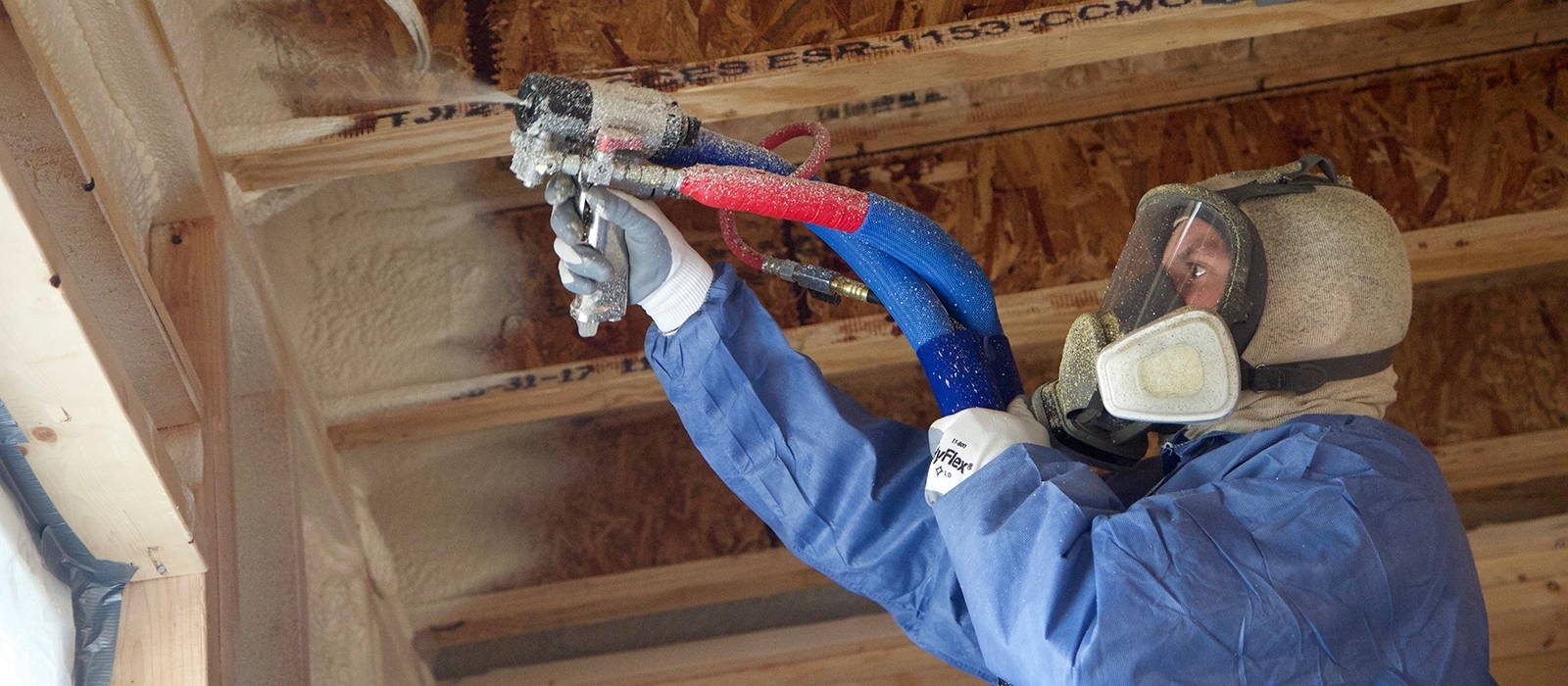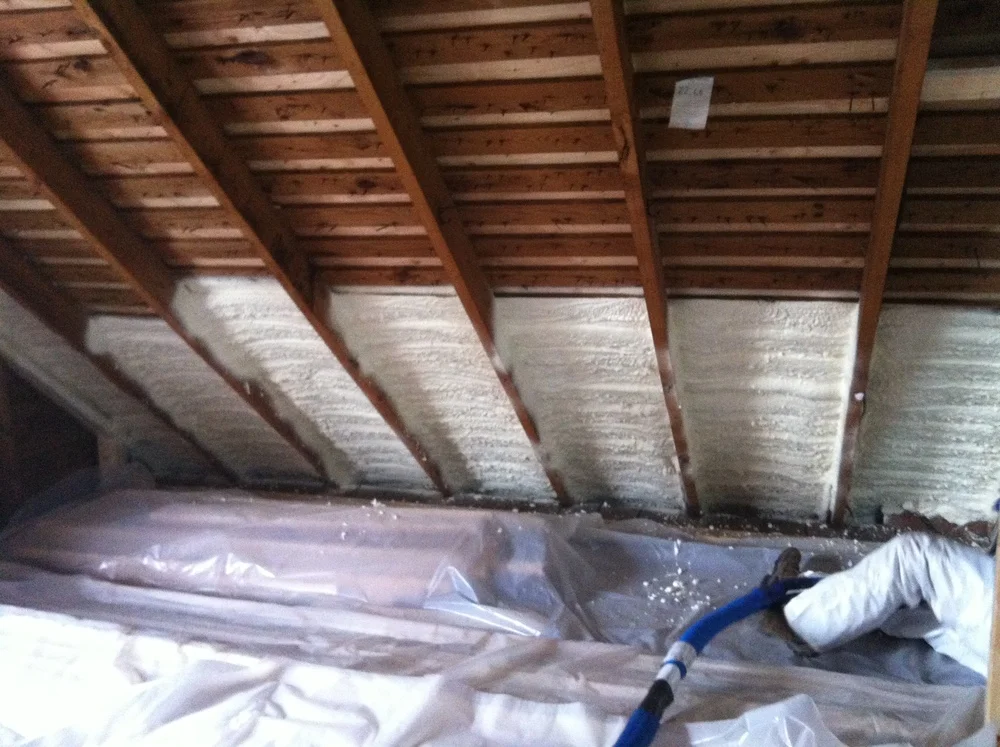Leading Applications of Spray Foam for Residential and Commercial Properties
Leading Applications of Spray Foam for Residential and Commercial Properties
Blog Article
Spray Foam: The Ultimate Service for Air Sealing and Insulation
Spray foam insulation has become a leading remedy for reliable air sealing and thermal insulation, offering an unique mix of residential or commercial properties that set it apart from traditional approaches. Its ability to broaden and load spaces makes it specifically efficient in avoiding air leakage, which can significantly impact energy performance. Understanding the full scope of its benefits, setup processes, and contrasts with various other insulation types is critical for making notified choices. As we discover these aspects, the ramifications for both brand-new buildings and retrofits end up being progressively substantial. What variables should influence your choice?
What Is Spray Foam?
Spray foam is a versatile insulation product that incorporates the concepts of air sealing and thermal resistance to enhance power performance in structures. Composed primarily of polyurethane or various other comparable substances, spray foam is used as a liquid that broadens upon call with surfaces, developing a solid, continuous layer of insulation. This one-of-a-kind home allows it to fill spaces, splits, and voids that conventional insulation products might forget, giving a remarkable air seal.
There are 2 main kinds of spray foam: open-cell and closed-cell. Open-cell spray foam is lighter and extra versatile, using outstanding sound absorption and a lower R-value per inch - Spray Foam. In comparison, closed-cell spray foam is denser, supplying a higher R-value, wetness resistance, and added architectural integrity to constructing components
The application process generally entails specific devices, guaranteeing a seamless application that sticks to different substrates, including concrete, metal, and wood. This adaptability makes spray foam suitable for both brand-new building and constructions and retrofitting existing frameworks. Its ability to develop a closed obstacle substantially adds to lowering power usage and improving interior air top quality, thus making it a preferred option among homeowners and builders alike.
Advantages of Spray Foam Insulation
Among the most considerable benefits of spray foam insulation is its extraordinary ability to produce a continual air barrier, which effectively reduces energy loss. Unlike standard insulation products, spray foam increases to fill gaps and splits, ensuring that air leak is drastically minimized. This particular not just boosts power efficiency however additionally results in reduce energy costs over time.
In addition, spray foam insulation offers premium thermal resistance, adding to a much more steady indoor setting. Its high R-value per inch permits reliable insulation in restricted spaces, making it excellent for attic rooms, wall surfaces, and crawl areas. The moisture-resistant residential properties of spray foam assistance avoid mold and mold development, promoting much healthier living conditions.
One more critical advantage of spray foam insulation is its sound-dampening qualities (Spray Foam). It successfully minimizes sound transmission in between rooms, producing a quieter and extra comfortable home environment. The resilience of spray foam also stands apart, as it does not droop or settle in time, keeping its efficiency throughout its lifespan
How Spray Foam Works
Recognizing just how spray foam insulation works is essential for appreciating its efficiency in air securing and thermal resistance. Spray foam insulation includes two primary components: isocyanate and polyol material. When these components are combined, they go through a chemical response that causes the product to broaden rapidly, developing a thick foam that fills gaps, cracks, and cavities.
As the foam increases, it adheres to surfaces, developing a closed seal that dramatically decreases air infiltration. This particular makes spray foam insulation highly reliable at avoiding drafts and wetness penetration, which can cause energy loss and damages with time. Furthermore, the closed-cell variation of spray foam provides exceptional thermal resistance as a result of its stiff framework, properly minimizing heat transfer.
The distinct residential or commercial properties of spray foam enable it to satisfy uneven surface areas, making certain comprehensive coverage and a seamless barrier. Because of this, spray foam insulation not just enhances energy effectiveness however additionally adds to enhanced interior air high quality by minimizing the buildup of toxins and irritants. Inevitably, comprehending the technicians behind spray foam underscores its function as a premium option for insulation and air securing in both residential and business applications.
Installation Process Review

Before setup, the room must be adequately cleaned up and prepped, making certain that surfaces are without particles, dust, and wetness. This step is vital because contaminants can jeopardize attachment and total performance. Once the location is prepared, the application involves blending the two components of the spray foam, which broadens upon contact and loads spaces you could try these out successfully.
Educated experts ought to carry out the setup, using specialized devices to make sure consistent protection and ideal thickness. Safety and security precautions, including using protective gear and ensuring proper air flow, are necessary during this process. After application, the foam typically remedies promptly, forming a solid obstacle that boosts power effectiveness.
Contrasting Spray Foam to Standard Insulation
When examining insulation choices, spray foam insulation stands apart in comparison to traditional products such as fiberglass and cellulose. Among the main advantages of spray foam is its exceptional air sealing capabilities. Unlike fiberglass and cellulose, which can allow air seepage, spray foam increases upon application, loading voids and holes to develop an impermeable seal. This results in enhanced power efficiency, as much less warmed or cooled down air escapes the home, causing lower energy expenses.
Furthermore, spray foam provides a higher R-value per inch than standard insulation kinds, providing even more effective thermal resistance in a thinner profile. This particular is specifically beneficial in rooms with minimal tooth cavity deepness. Furthermore, spray foam is resistant to moisture and mold development, which can be a substantial worry about cellulose and fiberglass, particularly in damp atmospheres.
However, spray foam insulation typically brings a higher in advance price than its standard counterparts. Homeowners must consider this initial investment versus lasting energy financial savings and performance benefits. Eventually, while both insulation kinds serve their objective, spray foam emerges as a more sophisticated option for modern-day insulation demands, especially in terms of air securing and thermal effectiveness.

Verdict
In summary, spray foam insulation represents an extremely reliable service for attaining click site optimal air sealing and thermal resistance. Its unique residential or commercial properties, including wetness resistance and noise dampening, make it suitable for numerous applications in both brand-new building and constructions and retrofitting projects (Spray Foam). Although the preliminary costs may be greater contrasted to standard insulation materials, the long-term advantages, such as significant power cost savings and improved indoor air top quality, justify the financial investment and highlight its value in modern structure methods.
Spray foam insulation has actually emerged as a leading option for efficient air sealing and thermal insulation, offering an one-of-a-kind mix of properties that establish it apart from conventional methods.Spray foam is a functional insulation material that incorporates the principles of air securing and thermal resistance to enhance power efficiency in structures.When assessing insulation alternatives, spray foam insulation stands Spray Foam out in comparison to typical materials such as fiberglass and cellulose. Inevitably, while both insulation types offer their purpose, spray foam arises as a much more innovative service for modern-day insulation requirements, particularly in terms of air securing and thermal effectiveness.
In recap, spray foam insulation represents a very efficient solution for attaining optimal air securing and thermal resistance.
Report this page